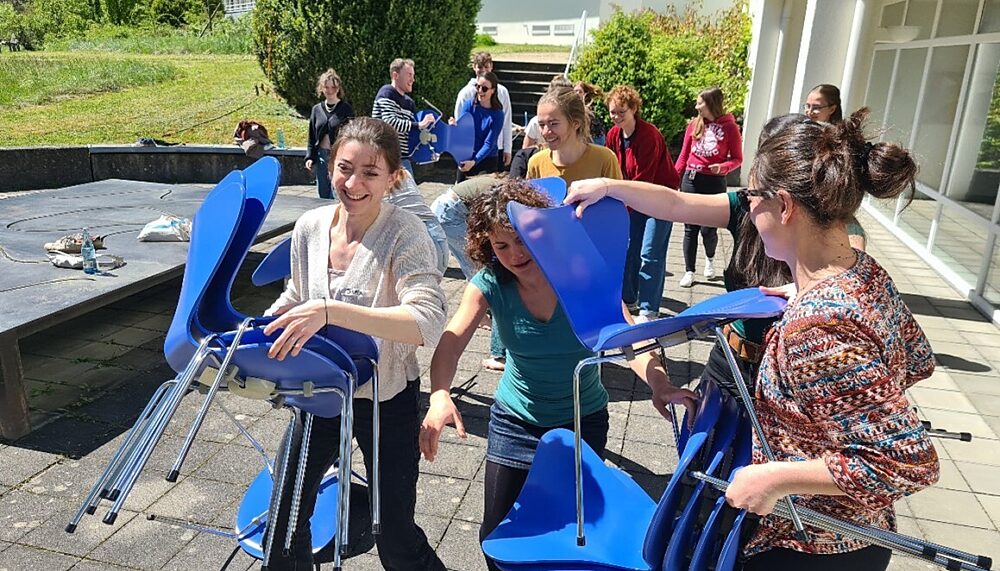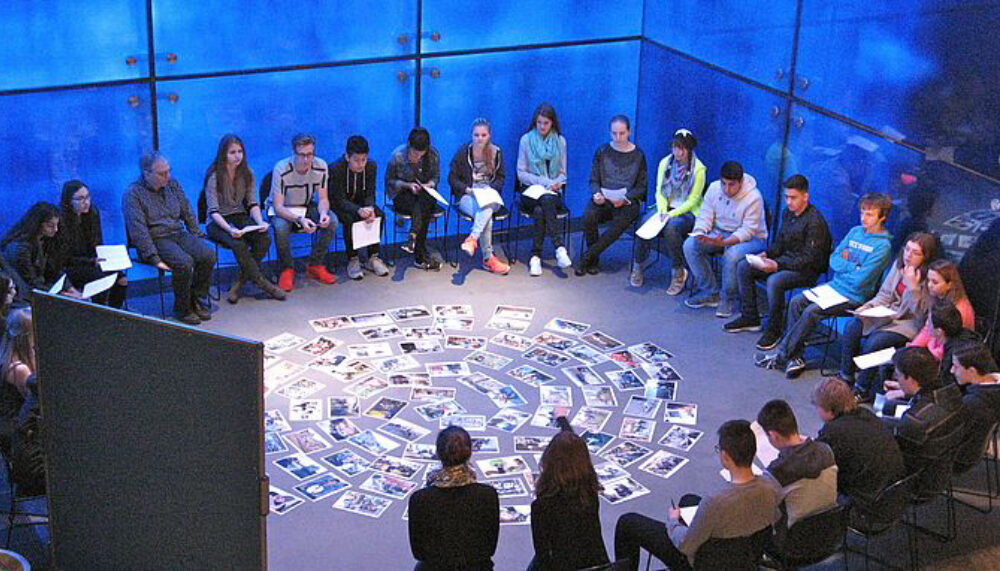BLOG POST | 2 Oct 2024
Peace education in action
An insight into our work at the Service Centre Peace Education

Our colleague reports on how we deliver educational programmes for schools in Germany.
By Jasmin Wölbl
Today I am visiting a secondary school on behalf of the Service Centre Peace Education Baden-Württemberg. I look into the partly excited, partly hesitant faces of 25 students. They are waiting for our workshop to begin, which is about exploring personal and academic ideas of peace. We brought along specific examples from peacemakers all over the world and we will discuss the question of what peace means to these students.
Two hours later, it was difficult to decide what my highlight was. The discussion in which the students were asked to take a position on whether they think there is peace in Germany. Or the creative ideas they came up with for student activities at schools. The evaluation of the feedback forms we always hand out at the end of a workshop showed that what surprised the pupils the most was how diverse the notion of peace is.

School workshops and learning material for teachers
The Service Centre has existed since 2015 as a permanent collaboration between the Berghof Foundation, the Regional Centre for Civic Education (lpB) and the Baden-Württemberg Ministry of Education and Cultural Affairs, intending to strengthen peace education in schools. Over this time, we have continuously expanded and developed our services. In just the first few months of this year, 75 workshops have already taken place in schools in Baden-Württemberg (a Southern state of Germany) – matching the total number held throughout 2023. This demonstrates both the growing demand and our enhanced efforts.
We also publish public peace education learning materials, provide teacher training, offer advice to educators and have developed a certification programme for schools. Throughout this long-term project, we have not only expanded our work but also reached new target groups. For example, we have successfully launched programmes for primary schools and special education institutions.
One of the main pillars of our work is delivering school workshops that are directly tailored to our most important target group: the students. We offer seven different workshop formats on topics such as democratic participation, the culture of debate and conflict analysis. The interest in the programmes is enormous, largely due to the many questions that students and teachers have about current wars and social challenges.
"I'm glad you're here!" says the teacher of a Year 10 class, greeting my colleague and me. It’s a phrase I have heard often since the recent escalation of the conflict in the Middle East. There is a significant need for teachers to address this issue, but many are concerned that they lack the necessary expertise or may struggle to create the space for age-appropriate and sensitive discussions in everyday teaching. The Service Centre is often called in by schools precisely when sensitive issues arise, which is a testament to the trust we have built as a reliable partner.
Interested young adults support our workshops
In addition to the project team, around 40 freelancers travel around the state Baden-Württemberg week after week to hold workshops for the Service Centre in order to respond to all enquiries. Without them, it would be unthinkable to offer a comprehensive programme since there are 1,650 secondary schools in the area.
The motivation of our freelances is one of the Service Centre's most valuable resources – it’s both tangible and contagious, even in the classroom.
Our freelancers are dedicated individuals with experience in areas such as working with refugees, experiential education, Christian or Muslim youth work and various other professional and academic fields. This group reflects the diversity of the classrooms better than our project team ever could. Additionally, the freelancers are often closer to the students in their everyday lives than many teachers, thanks to our approach of learning from and with peers. For instance, our youngest freelancer is currently 18 years old.
Before delivering these workshops, the candidates who would like to work as freelancers with us first attend our basic course. In this course, we discuss the peace education approach, the principles and rules of political education work in Germany (Beutelsbach Consensus) and how to handle challenging situations in the classroom. Afterwards, they observe a workshop in a school setting to gain practical insights.
The freelancers join our programme because they believe in the impact of this work. As a result, they often engage deeply, advocating for issues important to them, such as reviewing our formats with a critical lens on colonialism and trauma sensitivity. This makes it incredibly valuable for us to test new workshop formats with them first and engage in critical discussions before introducing them in schools.
Their willingness to familiarise themselves with topics, offer their perspective and share this work to the outside world inspires me during every training course. In my opinion, this motivation is one of the Service Centre's most valuable resources – it’s both tangible and contagious, even in the classroom.
Find out more about the Service Centre Peace Education: www.friedensbildung-bw.de (in German)
This article was updated on 14 October 2024 to correct a mistake.
Media contact
You can reach the press team at:
+49 (0) 177 7052758
email hidden; JavaScript is required


